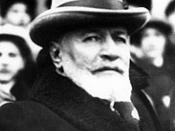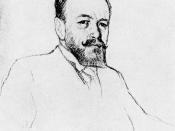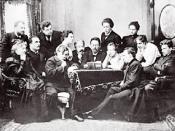1863-1938, Russian theatrical director, teacher, and actor, whose original name was Constantin Sergeyevich Alekseyev. He was cofounder with Vladimir Nemirovich-Danchenko of the Moscow Art Theater in 1898, which he would remain associated with for remainder of life. He also achieved renown as a director of opera. As a director, he stressed ensemble acting as well as complete coordination of all phases of production. His outstanding productions included many of the plays of Chekhov, in which he tried to strip away rhetorical clichés to enter the emotional core and complex psychology of the characters. Stanislavsky stressed the importance of the actor's inner identification with the character and the actor's natural use of body and voice. His training, now termed the Stanislavsky method, or "method" acting, had a vast influence on modern schools of acting. In New York City the Actors' Studio adapted many of his ideas to their use.
Konstantin Stanislavski unequivocally challenged traditional notions of the dramatic process, establishing himself as one of the most pioneering thinkers in modern theatre.
Stanislavski coined phrases such as "stage direction", laid the foundations of modern opera and gave instant renown to the works of such talented writers and playwrights as Maksim Gorki and Anton Chekhov. His process of character development, the "Stanislavski Method", was the catalyst for method acting- arguably the most influential acting system on the modern stage and screen. Such renowned schools of acting and directing as the Group Theatre (1931- 1941) and The Actors Studio (1947-) are a legacy of Stanislavski's pioneering vision.
Like all pioneering thinkers however, Stanislavski stood on the shoulders of giants. Much of the thought and philosophy Stanislavsky applied to the theatre derives from his predecessors. Pushkin, Russia's original literary hero and the father of the native realist tradition, wrote that the goal of the artist...


